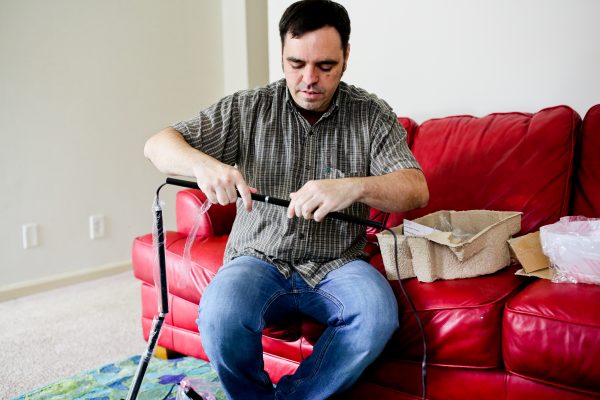Atlanta Resettlement Agencies Cut Staff As Refugee Arrivals Drop

Volunteer specialist Sarah White attends World Relief Atlanta’s annual New Americans Celebration at the Georgia state Capitol. At World Relief Atlanta, a resettlement agency in Stone Mountain, 21 of 30 employees were laid off in the past year.
Courtesy of Jathan Caldwell / World Relief Atlanta
The number of refugees arriving in Georgia is down dramatically.
Resettlement agencies said the state is resettling about a third of what it has in previous years. This means these agencies in Atlanta are laying off staff or eliminating positions.
World Relief Atlanta
At World Relief Atlanta, a resettlement agency in Stone Mountain, 21 of 30 employees were laid off in the past year. It now has a staff of nine people.
Fewer refugees coming in means reduced federal funding to resettle them.
Joshua Sieweke, director of World Relief Atlanta, said part of the problem is the number of refugees the Trump administration declares it will accept — the annual presidential determinations — has not been accurate.

“We were told to expect 450 [refugees], but now our best estimates are around 100, and that means we will only receive money for 100,” Sieweke said.
In 2016, his group helped resettle about 600 refugees in the Atlanta area. He said World Relief will need to shift from depending on federal funding to donations from local churches.
“[Refugees] are suffering, and we need to do what we can to eliminate that suffering and give them hope and a chance to rebuild their lives,” Sieweke said. “As an American, I think it’s incredibly important because it represents our country’s great history and tradition and the values that have made our country so great. We have been blessed, and we have a great opportunity to then be a blessing to others.”
New American Pathways
Other agencies including New American Pathways, the International Rescue Committee and even the Georgia Department of Human Services (DHS) Refugee Program have also eliminated positions because of fewer arrivals.
“After the inauguration of Donald Trump, we were impacted by travel bans and reduced refugee numbers so we saw a decline in 2017, but it is not as significant as what we’ve seen this year,” said New American Pathways CEO Paedia Mixon. “Until recently, you usually saw that the amount of refugees you actually welcomed was within 10 percent of the amount you were contracted for. That’s no longer the case.”

In 2017, U.S. agencies expected to resettle 110,000 refugees, but only about 53,500 refugees were resettled. This fiscal year, 45,000 refugees is the proposed number, but Mixon said the U.S. is on track to welcome around 21,000 refugees.
“From an operational point of view, it’s very difficult. We have to be prepared to resettle the number of people we’ve contracted for, and without knowing until halfway through the year, that costs us money,” Mixon said. “This will be the first time in over a decade that we’ll end the year in the red, and we’ll have to use some of our reserve funds. What’s even more challenging is, from a morale point of view, we’re seeing families that are separated, not knowing when people are going to arrive.”
International Rescue Committee
Justin Howell is deputy director of the International Rescue Committee in Atlanta. It’s the largest resettlement agency in the metro area and has a staff of nearly 60 people.
Like other agencies, Howell said, it has expanded whom it serves and is providing existing refugees with more support.
“The common [misperception] is that we serve only refugees,” Howell said. “We’ve made some shifts in our programming; we have been able to build out some of our auxiliary services to acknowledge the fact that there are needs within the community. We serve refugees, immigrant communities and the community itself.”








